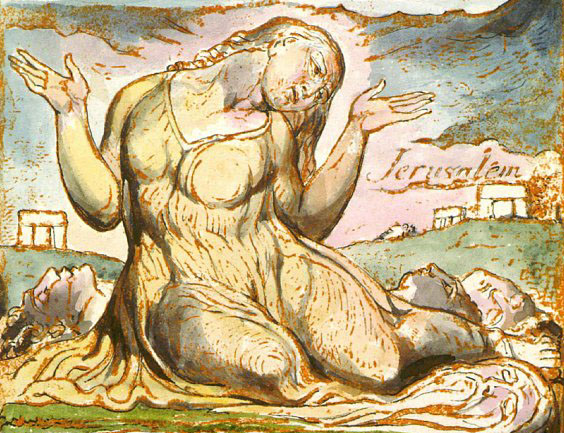“The Emanation of The Giant Albion” from Blake’s Jerusalem (1804)
Further to Michael’s earlier post “Laissez-Faire is Anti-Christian,” in this week’s issue of The New Statesman, guest edited by the Archbishop of Canterbury, the Most Reverend Dr. Rowan Williams, there’s a fascinating editorial about the corporatist actions of the coalition government in Britain. Perhaps most interesting, and in line with my understanding of Frye’s politics, are the last three paragraphs:
For someone like myself, there is an ironic satisfaction in the way several political thinkers today are quarrying theological traditions for ways forward. True, religious perspectives on these issues have often got bogged down in varieties of paternalism. But there is another theological strand to be retrieved that is not about “the poor” as objects of kindness but about the nature of sustainable community, seeing it as one in which what circulates – like the flow of blood – is the mutual creation of capacity, building the ability of the other person or group to become, in turn, a giver of life and responsibility. Perhaps surprisingly, this is what is at the heart of St Paul’s ideas about community at its fullest; community, in his terms, as God wants to see it.
A democracy that would measure up to this sort of ideal – religious in its roots but not exclusive or confessional – would be one in which the central question about any policy would be: how far does it equip a person or group to engage generously and for the long term in building the resourcefulness and well-being of any other person or group, with the state seen as a “community of communities”, to use a phrase popular among syndicalists of an earlier generation?
A democracy going beyond populism or majoritarianism but also beyond a Balkanised focus on the local that fixed in stone a variety of postcode lotteries; a democracy capable of real argument about shared needs and hopes and real generosity: any takers?


The the Archbishop of Canterbury appears to be a hot topic on the blogs this week. See
http://www.butterfliesandwheels.org/2011/quel-horrible-surprise/
http://choiceindying.com/2011/06/11/putting-on-a-serious-public-face/